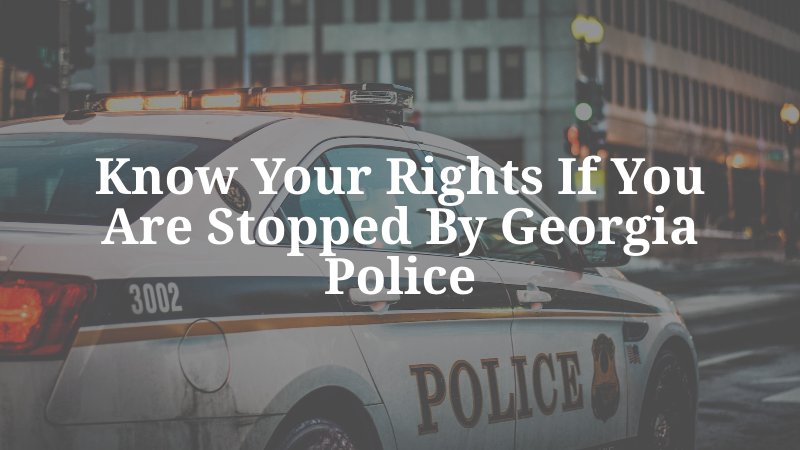Know Your Rights if you are Stopped by Georgia Police
Everyone has rights when it comes to interaction with police officers. However, there is nothing that gives you the right to be rude or belligerent, to produce false documents, or to lie. If you believe there is no reason to be stopped, and you know there is no reason for an officer to arrest you, then do not create one.
This blog will set out certain situations and your rights in these situations should be stopped or pulled over by a police officer in Georgia.
The Basics
How you act and what you say to a police officer is important and will hold consequences if you do not remain calm and polite.
One does not have to answer any questions, and you cannot be arrested if you refuse to identify yourself. However, if you are charged with prowling or loitering, then you must identify yourself. If you are stopped while driving, then you must produce your license, the vehicle’s registration and proof of insurance.
You are not obligated to give consent to a search of your car, your home or yourself. If the officer says there is a warrant, then ask to see it. If you specifically and clearly state, “I do not consent to this search,” but the search continues, then repeat the same statement. The worse thing that can happen is for you to physically resist or try to halt a search.
There is a good chance that the officers will have body cams, the patrol cars will have dash cams and the people at the periphery will have cell phones recording the incident.
Your point can be made, and your position defended, later but not at the scene.
Stopped for Questioning
Again, remain calm, be polite (if you choose to speak) and keep your hands in plain sight.
You do not have to say anything, and you will be perfectly within your right to stay silent. In this case, clearly state to the officer, “I wish to remain silent.” Then do so.
Although you do not have to say anything including the information to identify yourself verbally, it is recommended that you at least produce your ID—silently.
Please keep in mind that you are obligated to produce your license, registration and insurance only if you were driving or if the officer has probable cause. Do not make it easy for the officer and give him cause when none existed before.
Always ask if you are free to leave. If you are free to go, then leave slow and calm. Never run from an officer under any circumstances.
If you are not free to go, but not under arrest, then you are detained. In this situation, the officer can pat you for weapons on the outside of your clothing—nothing more. You can say, calmly and clearly, “I do not consent to this search.” Then be quiet. If you feel that your rights have been violated as to the extent of the search, then file a complaint later.
Do not physically attempt to halt the search, Again, your point can be made, and your position protected, at a later time. Let the body and the dash cams, and the cell phones of others, continue to record as you stay calm and collected. Clearly state your position and do not go off script.

Stopped in a Car
After you have pulled over to a safe place outside of the travel lane, turn off the engine, turn on an interior light, open the window about halfway and keep your hands either on the wheel or in plain sight.
Remember, in this situation, you must produce your license, the car registration and proof of insurance if requested. Should the officer believe your car was involved in a crime, then your car can be searched without your consent and without a warrant. Again, make it clear that you do not consent to the search, then keep quiet.
If you and your passengers are asked to come out of the car, no one needs to answer any questions. Everyone has the right to remain silent throughout the ordeal.
If you are cited with a ticket, you should sign it, unless you want to gamble with the situation and be arrested. By not signing a ticket could be grounds for an arrest.
Stopped and Arrested
Do not resist regardless of innocence or guilt. Again, your position can be defended at a later time.
You can remain silent, as this is always your choice, but immediately ask for an attorney. Do not give any information to the police officer other than your name, age, and address. Even if you began answering some of the officer’s questions, you can stop doing so at any time until your attorney is present.
The police officers cannot listen to the call you have the right to place. You have the right to appear in front of a judge within 48-72 hours after the arrest. You should demand this right.
Most important, do not make any decisions regarding your case unless your attorney is present or, at the very least, you have spoken with your attorney about any decision.
The most important aspect of all of this is to do your best to stay calm and quiet. Should there be any misconduct on behalf of a police officer, it should not be challenged, nor will it be resolved, on the street.
Please do not escalate an uncomfortable situation to one with cause for your arrest.

